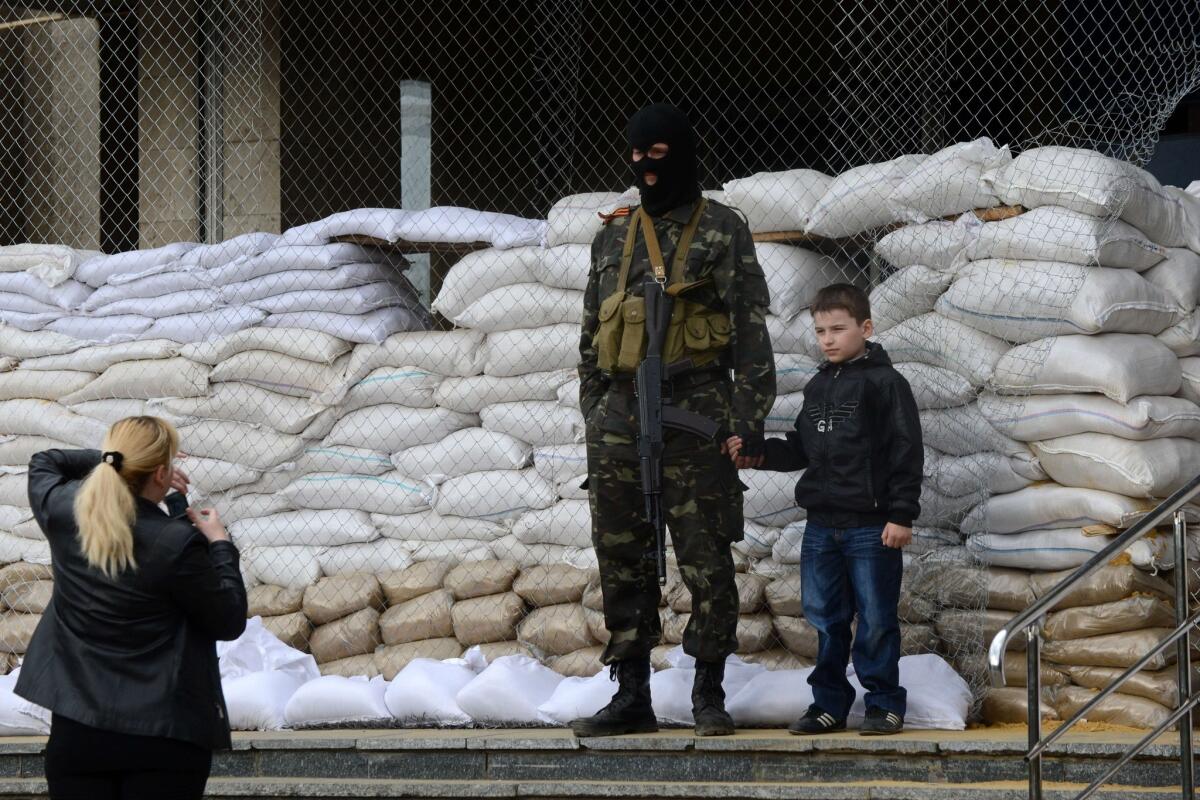Russian and Ukrainian officials trade blame for continued violence

WASHINGTON — The fragile diplomatic accord to resolve the Ukraine crisis frayed Sunday as an armed clash erupted in eastern Ukraine and top Russian and Ukrainian officials, appearing on television talk shows, each demanded the other side lay down its weapons.
Russia’s ambassador to the United States, Sergey Kislyak, said a gunfight early Easter morning that left at least three people dead at a checkpoint outside the eastern Ukrainian city of Slovyansk showed the need for all sides to disarm.
Pressed by Chris Wallace, the host of “Fox News Sunday,” Kislyak declined to say whether Russian President Vladimir Putin would tell the pro-Russian separatists to end their armed occupation of government buildings in eastern Ukraine. Militants have seized government and communications facilities in more than a dozen cities.
Kislyak said Russia was committed to using its influence “to try to de-escalate and defuse the situation.”
Kislyak did not appear optimistic that the diplomatic agreement signed Thursday in Geneva by the U.S., Russia, Ukraine and the European Union would solve the standoff between the new government in Kiev, the Ukrainian capital, and Russia, which already has annexed the Ukrainian region of Crimea.
“Ukrainian colleagues have suggested that [the agreement is] not applicable to what is happening in Kiev, that the far-right groupings are not going to be disarmed,” he said. “Under such circumstances, you shouldn’t expect that the other part of the political spectrum will be willing to rush in implementing the agreement.”
On NBC’s “Meet the Press,” Ukrainian Prime Minister Arseny Yatsenyuk placed the blame for Sunday’s clash in Slovyansk on Russia.
“Russia triggered this violence and Russia supported these terrorists and Russia was obliged to … condemn terrorists and to condemn those so-called peaceful protesters with AK-47s in their hands, shooting into civilians and shooting into Ukrainian riot police,” Yatsenyuk said.
“And if Russia pulls back its security forces and former KGB agents, this would definitely calm down the situation and stabilize the situation in southern and eastern Ukraine.”
Yatsenyuk accused Putin of seeking to restore the Soviet Union. Kislyak dismissed that idea “as a false notion.”
“We just want the Ukrainians to find a way of a dialogue, a new constitution, that would help them to live in a country that is democratic, that supports the rights of all the ethnic groups, including certainly Russians,” Kislyak said. “We want to have a friendly neighbor, because for us all, irrespective of what is happening, Ukrainians are just our brothers.”
Two members of the Senate Foreign Relations Committee, Sen. Bob Corker (R-Tenn.) and Sen. Chris Murphy (D-Conn.), said on “Meet the Press” that the standoff in Ukraine proved the need for the Obama administration and European allies to increase pressure on Russia through harsher economic sanctions.
“I think the time is now to rapidly ratchet up our sanctions, whether it’s on Russian petrochemical companies or on Russian banks,” Murphy said.
The White House has prepared another list of Russian individuals and institutions to sanction if Moscow does not meet its commitments under the Geneva accord. But the administration is not expected to slap sanctions on whole sectors of the Russian economy unless tensions escalate sharply.
Kislyak warned the U.S. and Europe against introducing further sanctions.
“You cannot work with Russia and try to achieve anything with us through the language of sanctions,” the Russian ambassador said. “The sanctions that have been introduced certainly are a significant gesture of the revival of the Cold War mentality. But it’s Russia. It’s a very solid state, well-to-do, a well-developing country. We can withstand pressures.”
Russia’s economy, however, has been battered by fallout from the Ukraine crisis and the limited U.S. and European sanctions so far. Kremlin officials reported last week that hard-currency reserves were falling as investors fled the country, and they revised their economic growth outlook to near zero.
More to Read
Sign up for Essential California
The most important California stories and recommendations in your inbox every morning.
You may occasionally receive promotional content from the Los Angeles Times.










